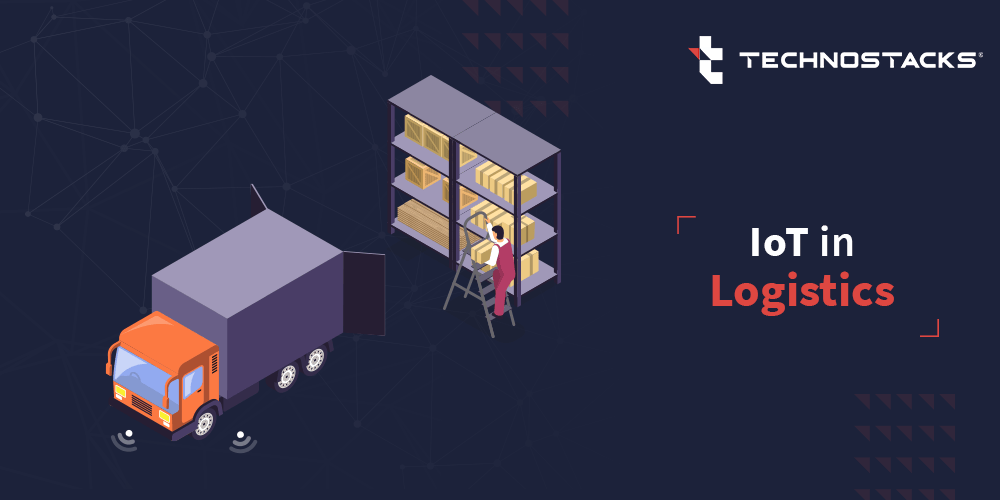Ways IoT Can Enhance The Business Operations In Logistics
For logistics and transportation companies, efficiency in operation is a must. IoT improves the processes in logistics and it can make sure that there wouldn’t be the chances of lower productivity or lower income. The digital age gives some relief to Enterprises with a range of technological benefits.
Technological advancements have now brought efficient internet connectivity resulting in the internet of things taking a major role in the logistics sector.
Besides, it’s worth noting that investments in the IoT also allow Enterprises to build the connection to the devices to the centralized cloud network.
Logistics estimated to provide $1.9 trillion in value, gain additional profits from utilizing IoT in the logistics industry. Overall it is beneficial for helping the employees capture and share the critical data in real-time to act and strategize accordingly.
In this article, you’ll get a highlight regarding the ways IoT can be utilized in logistics.
- Increased visibility across teams
Transportation and logistics businesses around the world are considering supply chain efficiency as a Priority. It can make sure that the business is profitable and staying viable at all times.Research says that there will be more than 64B IoT devices worldwide by 2025.Maximizing the supply chain needs improvement of the end-to-end operations alongside the comprehensive visibility used to make strategic and timely decision making.That being said, mobile devices like barcode scanners, mobile computers, frequency identification systems can work for improved supply chain visibility and operations.
Also review:- IoT in Transportation
- Public transit management
Tracking of the real-time location of the public vehicles becomes essential for businesses because it keeps track of how the vehicles will arrive at the particular stop. The IoT ensures the real-time tracking of vehicles. That said, the passengers also get the estimated arrival time of the vehicle that ensures that they can reach their destination in the desired time.Transportation and logistics companies using RFID today are getting benefits with 100 percent shipping and receiving accuracy. The amount is 99.5 percent inventory accuracy, with 30 percent faster order processing and a 30 percent reduction in labor costs.With IoT, there is the eradication of the challenges in the public transit system because it continuously keeps tracking the data using GPS devices. Sending out the information to the central system for processing becomes favorable. - Inventory tracking
During the inventory control of the goods, there are several issues that Industries need to face. There are everyday issues related to the warehouses or the large stores. This scenario is the area that prioritizes IoT.Facilitation of the inventory in the large areas falls under the category of the smart shelf system. IoT Technology usage in logistics involves equipping the shelves in the supermarkets or the warehouses with the involvement of RFID tags and weight sensors.The system is favorable because it includes scanning the products both on display and also on the shelf. With the help of only one application, the manager gets concise notes regarding where the product is and what the weight of the product is. This sensor allows counting how many units are still in the stock.Also review:- How IoT can be used in asset management?
- Drone-based delivery
Drones are now actively working in different sectors, and logistics is no exception. The drones come with the involvement of the GPS Navigator that functions in locations with real-time coordinates. The role of such a Drone is to independently pick up the cargo right from the lockers and deliver it to the location.The sensors on the Drone make the service more effective. That said, drones come with special protection systems alongside the high-grade IoT systems installed on them. In addition to these, the facial recognition system in these drones also makes sure that there won’t be chances of making the shipment to the fraudster. - Reduce energy use for the transport system
Reduction of energy consumption is very important, especially when it comes to delivery of goods by sea. The basic control system comes inclusive of the level sensors, GPS, and fuel flow sensors. In this regard, IoT improves the processes in logistics by tracking how much diesel the particular vehicle is consuming when traveling for a distance.The Specialists can open the monitoring program and then get the relevant information. It can keep away the expenditures of diesel to a huge extent. Discrete Manufacturing, Transportation & Logistics, and Utility industries have spent approximately $40 billion each on IoT by 2020. So, it’s evident how powerful IoT is in the logistics sector. - Fleet management
Fleet management comes inclusive of plenty of the processes in the logistics and transportation business. Some of the important activities involved in the same are maintenance of the operations, management of the vehicle usage, to name a few.Optimizing asset utilization for driving greater operational efficiency has a close relation to the IoT value. In this regard, according to Cisco’s calculations, the value accounts for roughly 25 percent of the total value at Stake from IoT. - IoT app development companies design the apps with high precision. The computers, RFID systems, mobile scanners are helping enterprises get the increased visibility over the assets, thus giving the streamlining of operations.
- Easy identification of the goods
The goods do not hold the IoT capability by themselves. But you can make use of the RFID markers for identifying them. The QR codes or the Data Matrix codes are also very suitable for managing the good. Regardless of the hardware, it’s essential to note that the easy identification of the goods can curb the additional hassles to a huge extent.
Some of the FAQs on IoT Technology and Logistics Industry
- How can IoT improve the logistics process?
IoT in logistics keeps track of real-time data across the different operations. The accurate and real-time insights regarding the maintenance history, parts availability, and inventory records ensure that the managers get concise information regarding the centralized database.The data is very important for sharing and managing the goods. Besides, IoT can also develop security that’s of paramount importance. - How does the Internet of Things IoT affect logistics?
IoT in Logistics ensures streamlined transport. Improved performance of the warehouses ensures overcoming the issues related to future product management and failures. - How is IoT used in logistics?
Location and Route Management, Inventory Tracking and Warehousing, CBM and Breakdown Prevention, IoT, and Blockchain for Digital BOL are essential ways IoT is helping these businesses. - What are the goals of IoT technology for the logistics industry?
The goals of IoT Technology in Logistics are to use IoT to improve logistics processes – both in warehouses and beyond. It is showing promising effects in increasing the productivity of deliveries.
Key Takeaways
Finally, you have got vivid ideas regarding IoT benefits in the logistics industry. The logistics process-based IoT is helping track the object for transferring the current data of the transported assets. The IoT channel is very functional for remotely controlling the elements of the transport process.
That being said, it can save energy or ensure avoidance of the waiting Times. More and more Logistics companies are involving IoT in their sectors every day to give a hassle-free experience.
Technostacks is a leading IoT app development company and has experience in delivering IoT products for Logistics. You can check our work portfolio.
The expert developers at Technostacks are able to satisfy your business needs. Get a quote for more information.









